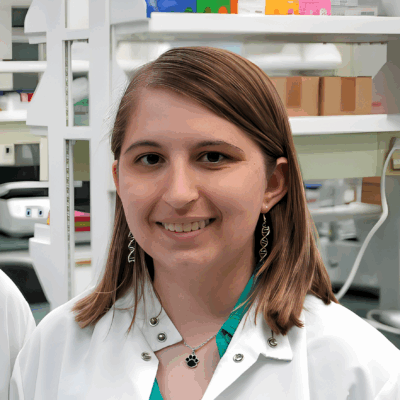Postdoc Spotlight: Shawna Cook

September 19, 2025
Shawna Cook is a postdoc in the Baker Institute for Animal Health and department of biomedical and biological sciences from Belton, South Carolina. She earned her Ph.D. from Purdue University, and her research focuses on the genetics of companion animals. She is a recipient of a Postdoc Achievement Award for Excellence in Mentoring as part of Cornell’s celebration of National Postdoc Appreciation Week 2025.
What is your area of research, scholarship, or work and why is it important?
My research focuses on the genetics of companion animals, particularly identifying genetic changes that make some animals more likely to develop certain diseases. This includes complex diseases, such as cancer, that have both genetic and environmental risk factors and that also impact humans. As purebred dogs have high genetic similarity within a breed, it can be easier to pinpoint the genetic changes contributing to disease in affected dogs than it is in diverse human populations. Learning from these natural models not only helps improve the health and welfare of dogs but also provides valuable insights into human health.
What are the broader implications of this research, scholarship, or work?
By identifying genes linked to disease, we can develop genetic tests that help breeders reduce disease incidence, leading to a healthier pet population. At the same time, this work sheds light on biological pathways that may also be important in people. For example, my work on gastric cancer in Belgian shepherd dogs has highlighted novel genes that may play a role in human stomach cancer. This kind of comparative research ultimately benefits both animals and people.
What does receiving a Postdoc Achievement Award mean to you?
I am truly honored to receive this award. Mentorship has been one of the most rewarding parts of my career so far, and it means a lot to know that my efforts to support and inspire students are recognized. I have been fortunate to have wonderful, supportive mentors to help me through my academic journey, and I aspire to do the same for others.
What hobbies or activities do you enjoy in your spare time?
Dog sports! I train and compete with my miniature American shepherds, Helix, Oki, and Geno, in a variety of sports, including nosework, barn hunt, dock diving, agility, and conformation. They earn titles based on their performance, with the title abbreviation added to their names. My dogs have more letters after their names than I do!
Why did you choose Cornell?
Cornell’s Baker Institute for Animal Health has a long history of groundbreaking research in veterinary medicine and genetics, and the opportunity to expand my knowledge of complex trait genetics with Dr. Jacquelyn Evans was a perfect fit for my career goals.
What is next for you?
I want to secure a faculty position where I can continue to work alongside pet owners to study companion animal genetics, as well as train and encourage students.
Do you have any advice for current graduate students?
Try to work on something that you are genuinely passionate about. It doesn’t make the projects stress-free, but loving what you do makes it easier to get through challenging times. I also encourage students to strive for balance between their work and personal life, because taking care of yourself outside the lab makes you more creative, resilient, and productive inside the lab.
